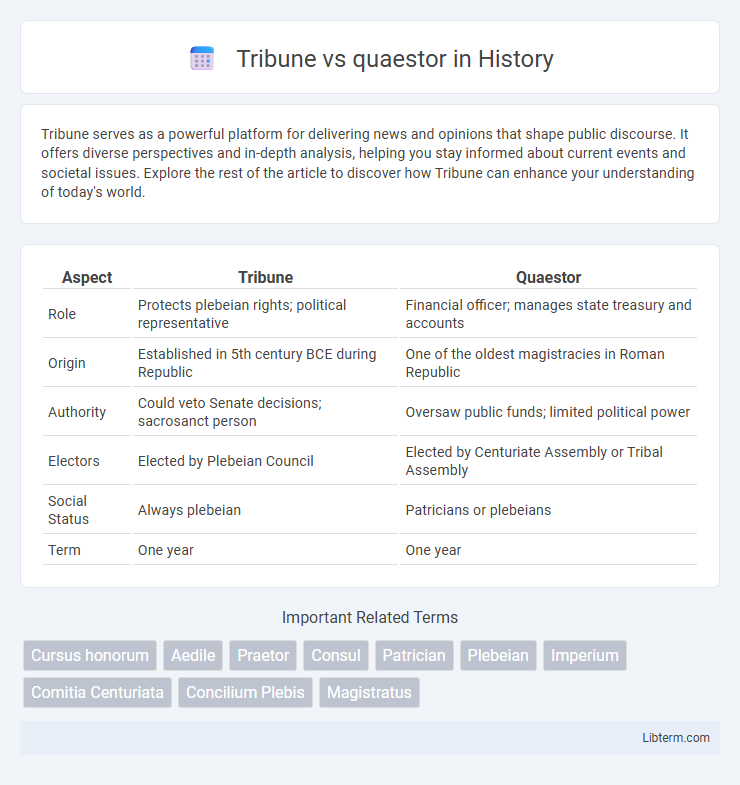Tribune serves as a powerful platform for delivering news and opinions that shape public discourse. It offers diverse perspectives and in-depth analysis, helping you stay informed about current events and societal issues. Explore the rest of the article to discover how Tribune can enhance your understanding of today's world.
Table of Comparison
| Aspect | Tribune | Quaestor |
|---|---|---|
| Role | Protects plebeian rights; political representative | Financial officer; manages state treasury and accounts |
| Origin | Established in 5th century BCE during Republic | One of the oldest magistracies in Roman Republic |
| Authority | Could veto Senate decisions; sacrosanct person | Oversaw public funds; limited political power |
| Electors | Elected by Plebeian Council | Elected by Centuriate Assembly or Tribal Assembly |
| Social Status | Always plebeian | Patricians or plebeians |
| Term | One year | One year |
Introduction to Tribune and Quaestor
The Tribune and Quaestor are key political offices in ancient Rome with distinct roles and responsibilities. A Tribune, specifically a Tribune of the Plebs, was an elected official representing the interests and protection of the plebeian class, granted the power to veto actions by magistrates. In contrast, a Quaestor served as a financial officer managing state treasury and public funds, often marking the first step in a Roman political career.
Historical Origins of Tribune and Quaestor
The historical origins of the tribune trace back to the early Roman Republic, where the office of the tribune of the plebs was established in 494 BCE to protect the interests and rights of the plebeians against patrician magistrates. The quaestor, originating around 409 BCE, served as a public official responsible for financial administration, including managing the treasury and military funds, reflecting Rome's evolving administrative complexity. Both offices exemplify Rome's adaptation of political roles to balance power between social classes and ensure efficient governance.
Roles and Responsibilities Compared
The Tribune of the Plebs held significant power to protect plebeian rights, possessing the authority to veto senate decisions and propose legislation, serving as a critical check on patrician dominance. In contrast, the Quaestor primarily managed financial administration, overseeing the state treasury, military funds, and public accounts, ensuring proper fiscal management within the Roman Republic. Both roles were essential in balancing political power and maintaining governance, with the Tribune focusing on political advocacy and the Quaestor on economic responsibilities.
Tribune: Powers and Influence
The Tribune of the Plebs wielded significant powers, including the ability to veto legislation and protect plebeian interests against patrician magistrates, effectively shaping Roman political dynamics. Their sacrosanct status granted them personal inviolability, which empowered tribunes to act as defenders of the common people without fear of retaliation. Through their influence in the Tribal Assembly and the right to propose laws, tribunes played a crucial role in balancing the power between social classes in the Roman Republic.
Quaestor: Duties and Functions
The quaestor was primarily responsible for managing financial matters in the Roman Republic, including overseeing the treasury and supervising public funds. Quaestors conducted audits, managed state revenues, and assisted magistrates in fiscal administration during military campaigns. Their role was essential in ensuring financial accountability and supporting the efficient operation of Roman governmental and military institutions.
Tribune vs Quaestor: Key Differences
The tribune and quaestor were distinct Roman offices with different roles and powers. Tribunes possessed significant political authority, including the power to veto actions of magistrates and protect plebeian rights, while quaestors primarily managed financial affairs such as treasury oversight and public funds. Tribunes were elected representatives of the plebeians, whereas quaestors were typically the first step in the cursus honorum, the Roman political career ladder, underscoring their administrative rather than legislative function.
Political Significance in Roman Society
Tribunes held significant political power in Roman society as representatives of the plebeians, possessing veto authority to protect their rights against patrician magistrates. Quaestors, while crucial as financial administrators, wielded less direct political influence and often served as the entry point to higher political careers. The tribunate's ability to convene the Plebeian Council and propose legislation underscored its pivotal role in balancing power between social classes during the Roman Republic.
Election and Career Pathways
Tribunes were elected annually by the Plebeian Council, serving as representatives protecting plebeian rights, whereas quaestors were elected by the Centuriate Assembly and held financial administrative roles as the initial step in the cursus honorum. Tribune positions did not lead to higher magistracies but offered significant political influence without formal career progression. In contrast, quaestorship was the entry point into the Roman senatorial career path, often followed by offices such as aedile, praetor, and consul.
Notable Tribunes and Quaestors in History
Notable tribunes in Roman history include Tiberius Gracchus, known for his agrarian reforms, and Gaius Gracchus, who advanced judicial and political changes. Prominent quaestors such as Cicero started their political careers handling financial administration before rising to higher offices. The roles of tribunes and quaestors were crucial in shaping the Roman Republic's political and administrative landscape.
Lasting Legacy and Modern Relevance
The Tribune and Quaestor established foundational roles in the Roman Republic, with the Tribune championing plebeian rights and the Quaestor managing financial administration, influencing modern democratic and bureaucratic systems. The Tribune's legacy persists in contemporary concepts of political representation and protection of minority rights, while the Quaestor's role evolved into modern fiscal oversight and public finance management. Their enduring impact is evident in constitutional designs that balance popular sovereignty with structured governance.
Tribune Infographic

 libterm.com
libterm.com